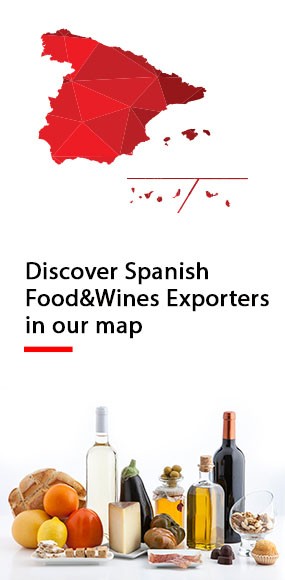.png.transform/rendition-xs/image_image%20(1).png)
Madrid Fusión and Andalusia, In The Spotlight for 14 International Journalists
A group of 14 journalists from 8 countries attended Madrid Fusión and lived an immersive experience to learn more about Andalusia's agri-food industry with Spain Food Nation.
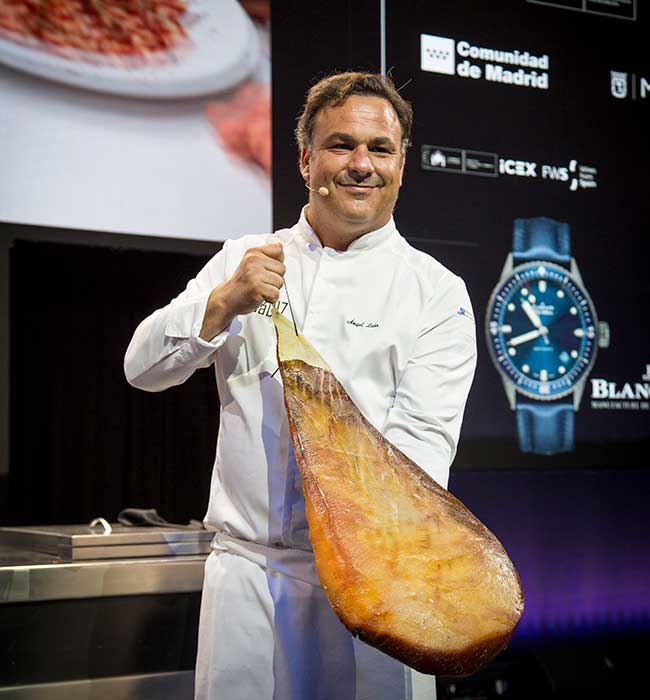
Getting a close-up look at Spain's gastronomy and its powerful agri-food sector, eating at several of its most prestigious traditional and avant-garde restaurants, visiting cutting-edge exporters and attending Madrid Fusión, the world's leading gastronomy conference, are just some of the experiences this group of journalists enjoyed, organized by Spain Food Nation.
The journalists on the trip came from Sweden, Mexico, Belgium, Croatia, Poland, Germany, the UK and Brazil and the activities kicked off with two days at Madrid Fusión. There they had the chance to get a feel for the current situation and innovation in Spanish gastronomy and connect with renowned chefs like Eneko Atxa, Ángel León, Joan Roca, and Fina Puigdevall, among others.
After two days at Madrid Fusión, the journalists headed south to Andalusia. Once there, they enjoyed a busy schedule of visits and tours where they collected testimonials, conducted interviews, made unforgettable memories and obtained very valuable material for future articles and reports.
Down in Andalusia
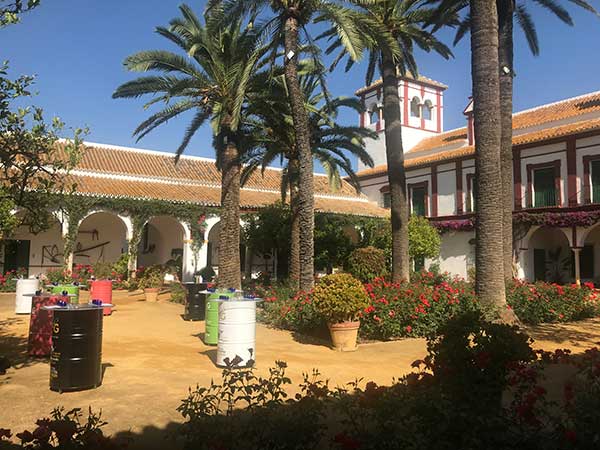
The first visit was to Hacienda Guzmán, a well-known olive oil producer in Seville which exports its extra virgin olive oils to more than 35 countries. Surrounded by 340 hectares of organic olive groves, the estate is one of the premises used to promote the declaration of the Andalusian Olive Grove Landscapes as a UNESCO World Heritage Site. More than six centuries ago, Hernando, Christopher Columbus’ son, exported olive oil produced in Hacienda Guzmán to America, making it one of the largest olive oil factories in the world. Nowadays, travelers can visit the mill, restored from the 17th century, along with the olivoteca, a unique collection in the world with more than 150 varieties of olive trees from 13 countries.
The journalists had the chance to taste Hacienda Guzmán’s extra virgin olive oils and learn more about its story, cultural heritage and current position in international markets.
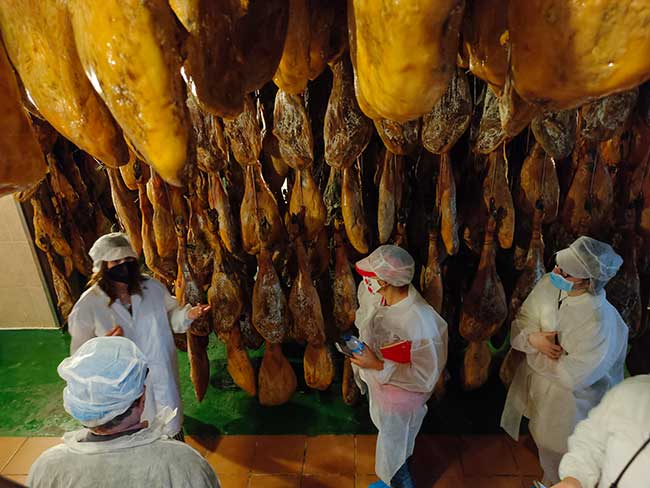
The next stop was Jabugo, in Huelva province. Jabugo is the name registered by the European Union to designate, protect and certify the quality and origin of ham shoulders and hind legs that are dried and matured in natural bodegas in the villages within the Sierra de Aracena and Picos de Aroche Natural Park. All products under PDO Jabugo come from 100% Ibérico pigs reared and left to roam freely in dehesa pastures.
The journalists visited the facilities of Montesierra, one of the 100% Ibérico acorn-fed PDO Jabugo ham producers. They had the chance to learn about the environmental importance of the dehesa, a unique ecosystem where Ibérico pigs roam freely, and the extensive process to produce this unique product.
Sherry and sustainable fishing
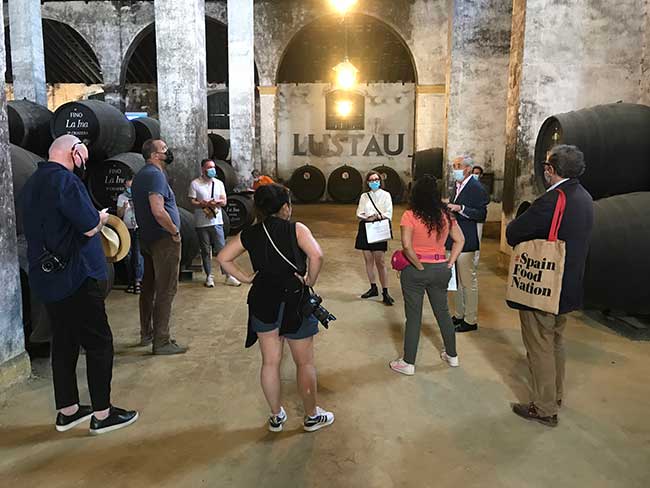
The trip continued in Andalusia, and the group traveled to Jerez de la Frontera, where they were enchanted by the magic of sherry wines. There, the wineries are given names like, “La Catedral” (The Cathedral), and this is no exaggeration: a mixture of grandeur and calm envelops the atmosphere of the chambers where the towering stacks of barrels – the famous criaderas and soleras – repose, waiting for the perfect moment to discover the sherry within. But the world of sherry, with its singular production method and numerous types of wine, can at times be somewhat confusing. Therefore, in addition to visiting Lustau wineries, the group attended a paired tasting to help clarify things, led by one of César Saldaña, president of the DO Jerez- Sherry-Manzanilla de Sanlúcar.
The proximity to the sea was the perfect excuse for their visit to conclude with three activities related to sustainable fishing. The first was at Conil Artisan Harbour, one of the most important ports for the seafood and fishing industry. It hosts about 60 artisanal vessels with a professional auction market of 2,000 square meters. These facilities are the first in Spain to offer total computerized service, ensuring all the traceability process with their own quality certification tag.
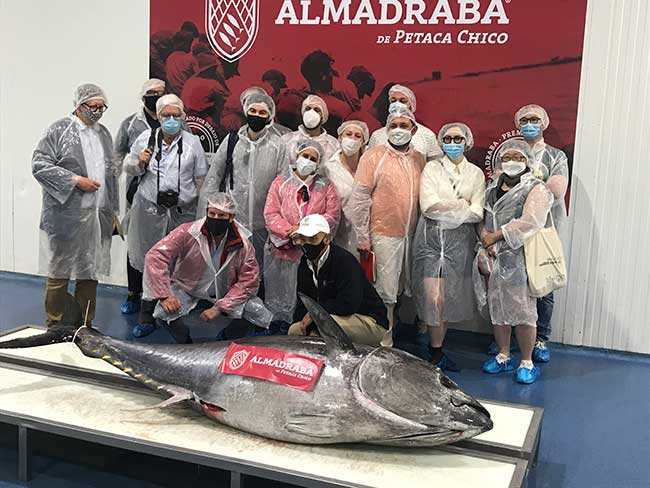
The next stop was the Barbate-based company Petaca Chico, which has more than 30 years of experience in the fishing industry and is a reference in the world of wild bluefin Almadraba tuna, a traditional fishing technique used essentially to fish for tuna in the waters of Andalusia at the precise time these fish are migrating between the Mediterranean and the Atlantic and vice versa. The typical fishing net known as the almadraba is really a kind of maze of nets placed in the path of the tuna fish, normally near the coast, that is gradually closed in order to corral the fish and then capture them. The international journalists could discover that absolutely everything from tuna is used. In fact, even a whole language has been created around it. You may hear of tuna belly or loin, the upper back akami, the kama block, otoro and even chutoro... Dark and light tail muscle meat, the noten, the middle back senaka and cheeks... In short, there are more than 20 different names for the different cuts of tuna. They were shown what a “ronqueo” is: the quartering action even has its interesting name, which refers to the noise of the knife.
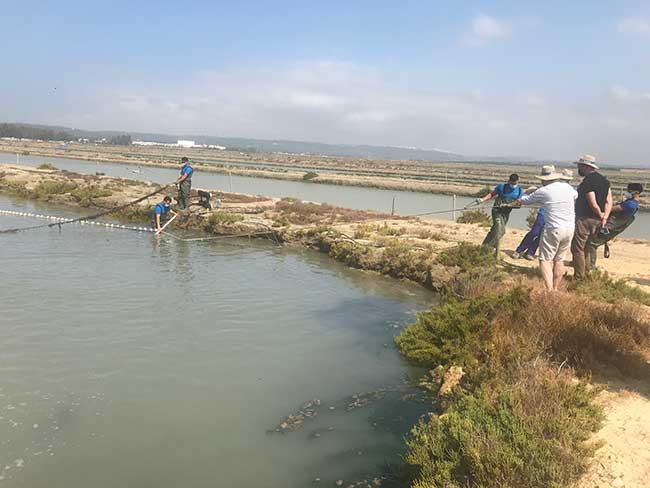
The last company they visited was also in Barbate: Lubimar, an example of sustainable aquaculture where the journalists could see the thousands of birds and wildlife that live in the estuary, where Lubimar sea bass and sea bream are growing. Unique in the world, Esteros Lubimar farm fish into the land. Lubimar has integrated a natural aquaculture system in a very special environment, restoring it and keeping it safe from different dangers.


